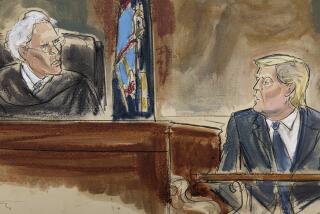Senators grill New York Fed chief over reports of lax bank oversight
Democratic senators on Friday hammered a key regulator over reports of lax oversight of large Wall Street banks that they said posed a risk to the financial system and broader economy.
William Dudley, the president of the Federal Reserve Bank of New York, faced nearly two hours of aggressive questioning from some of the most outspoken critics of the nation’s biggest financial firms.
The senators dismissed Dudley’s assertion that the banking system was safer now than it was before the 2008 financial crisis.
And they accused the New York Fed of having a culture of deferring to the large firms, such as Goldman Sachs Group and JPMorgan Chase & Co., they are responsible for regulating.
“Either you need to fix it, Mr. Dudley, or we need to get someone who will,” said Sen. Elizabeth Warren (D-Mass.).
Sen. Sherrod Brown (D-Ohio), who chairs a Senate Banking subcommittee, held the hearing after what he called “troubling reports” suggesting the New York Fed had returned to the type of weak supervision that led to the 2008 financial crisis.
No Republican senators attended the hearing.
In September, the nonprofit news website ProPublica and the public radio program “This American Life” reported on secret audio recordings made by former New York Fed employee Carmen Segarra.
Those recordings, made in 2012, appeared to show her supervisors at the New York Fed went easy on Goldman Sachs on a deal described as “legal but shady.”
Another report this week by the New York Times said a Goldman Sachs banker who had worked at the New York Fed obtained confidential documents from a former colleague at the agency.
“These recent reports should trouble any organization, but they are potentially catastrophic when the agency in question is responsible for four megabanks that alone account for more than $6 trillion in assets and more than 11,000 subsidiaries,” Brown said.
The New York Fed regulates large Wall Street banks and foreign bank subsidiaries based in New York.
An internal 2009 Fed report said that the agency was “excessively deferential to the banks being supervised,” said David Biem, a Columbia Business School professor who conducted the review.
The recent reports “suggest to me that not as much has changed as I would have hoped,” Biem told the subcommittee.
Dudley is a former Goldman Sachs partner who took over leadership of the New York Fed in early 2009. Although the agency has made improvements since the financial crisis, Dudley said the culture still “needs to be improved significantly.”
But he objected when Sen. Jeff Merkley (D-Ore.) asked if the agency was “asleep at the switch” for not identifying tax evasion activities by Swiss bank Credit Suisse that were the subject of a Senate investigation.
“We’re continuing to see how we can do our job better,” he said.
On Thursday, the Federal Reserve Board of Governors announced it was launching two internal reviews to determine if top officials were getting the information needed to properly oversee banks, including being made aware of “divergent views” among lower-level regulators.
The Fed has been criticized for being too cozy with the banks it regulates and for failing to identify the excessive risk-taking that led to the financial crisis.
“We need bank regulators who work to protect the American people and not the profits of giant banks,” Warren said.
Sen. Jack Reed (D-R.I.) said the New York Fed was a particular problem because its powerful president is chosen by a board of directors that includes members elected by the banks it oversees.
“The culture starts at the top, and the perception is you were essentially hired by the people you regulate,” Reed said.
The heads of all 12 regional Fed banks are selected that way. But Reed introduced legislation this week requiring the New York Fed president be nominated by the president and confirmed by the Senate, the same procedure for members of the Fed’s Board of Governors.
Reed said the move was needed because the head of the New York Fed is more powerful than the other regional presidents, including holding a permanent seat on the central bank committee that makes monetary policy.
For breaking economic news, follow @JimPuzzanghera on Twitter






